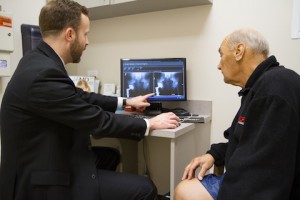Normally, hip conditions and all of the parts of the hip joint work together and the joint moves easily and without pain. However, disease or injury can disturb the normal functioning of a joint, which can result in pain, muscle weakness, and limited movement. And with longer life expectancies and greater activity levels, joint replacement is being performed in greater numbers on younger patients thanks to new advances in artificial joint technology, many of which are provided by Dr. Justin M. LaReau.

Why Dr. Justin M. LaReau?
Dr. LaReau is fellowship trained in joint replacement and hip preservation, and board certified in orthopedic surgery, providing expert knowledge and expertise in the area of hip conditions, preservation and treatment options. As one of the top chicago hip surgeons, Dr. LaReau brings years of valuable experience to every hip assessment.
How Do I Know If Joint Replacement Is Right For Me?
When joint pain is severe and interferes with daily activities and work, joint replacement may be an option. The pain you experience from arthritis and joint degeneration can:
- Be constant or intermittent
- Occur when you are moving or at rest
- Be located in one spot or in many parts of your body
The pain and the stiffness of joint degeneration may be worse during certain times of the day, or after certain activities such as:
- Walking
- Climbing stairs
- Getting in and out of a chair

Individuals with arthritis may even feel uncomfortable or have pain while resting or sitting in a chair or lying down. They may be uncomfortable at night, and the pain may wake them up.
The pain of joint degeneration can limit many everyday activities, such as:
- Walking
- Bending
- Going up and down stairs
- Getting in and out of a car
- Getting dressed
- Sexual activities
Joint degeneration can eventually make it extremely difficult for individuals to work and enjoy themselves. It also can make it difficult for individuals to care for themselves.
Tips for Healthy Joints
- One of the best ways to avoid or reduce joint discomfort is to lose excess body weight. Less weight equals less stress on your joints.
- Be sure to get adequate amounts of vitamin C and calcium. Vitamin C is necessary to for the formation of collagen that supports joint tissue. Calcium helps build strong bones, which reduces stress on joints.
- Stretching and strengthening activities can help maintain your range of motion, build muscle and promote flexibility. Some activities to consider include gardening, walking, bicycling and swimming. Talk with your physician about which exercises are right for you.
- Keep moving. Sitting or standing all day can cause joint stiffness. When possible, alternate between these two positions, ideally every 30 minutes.
- Remember to warm up and cool down every time you exercise to prevent injury and promote flexibility.
- Exercise in groups. It’s motivating, it’s social, and it builds self-esteem as you accomplish your goals together.
- If you’re having a hard time staying motivated to exercise regularly, consider adding music to your routine. Purchase a portable music player and bring along the tunes while you walk, jog, etc.
How Does the Hip Work?
The hip is a ball and socket joint that acts much like a ball bearing, allowing you to turn in different directions while supporting the body. At the upper end of your thigh bone (or femur) is a ball which fits into a socket. Cartilage (a layer of smooth soft tissue) covers the ball and lines the socket, and allows the ball to move easily in the socket. You are given only one coating of this cartilage in your lifetime.
Links to Societies
American Association of Hip and Knee Surgeons (http://www.aahks.org) – Established in 1991, the American Association of Hip and Knee Surgeons (AAHKS) is committed to its mission of providing educational opportunities to its members. For the past several years, Annual Fall meetings have addressed an increasingly broad array of scientific topics, such as implant design, results, surgical techniques and complications of primary and revision TJA, as well as the latest information available on socioeconomic issues affecting the specialty. Dr. LaReau is a member and Fellow of the AAHKS.
American Academy of Orthpaedic Surgeons: (www.aaos.org) This organization was founded in Chicago in 1933. It is an organization with worldwide influence, and is the world’s largest association of musculoskeletal specialists.
Outstanding patient resources are available are provided by the AAOS at the following website http://orthoinfo.aaos.org.
Dr. LaReau is an active member of the AAOS.
Related Topics
- Hip Pain
- Hip Fracture
- Stress Fractures of the Hip
- Periprosthetic Hip Fractures
- Femoral Neck Fracture
- Intertrochanteric Fractures
- Gluteus Tendon Tear
- Iliopsoas Impingement
- Ischiofemoral Impingement
- Femoroacetabular Impingement
- Osteoarthritis of the Hip
- Inflammatory Arthritis of the Hip
- Hip Bone Cysts
- Labral Cysts of the Hip
- Acetabular Subchondral Cysts
- Femoral Subchondral Cysts
- Hip Ligament Injuries
- Hip Flexor Strain
- Groin Injuries in Athletes
- Hip Flexor Pain
- Gluteus Medius Tear
- Hip Abductor Tears
- Hip Instability
- Hip Bursitis
- Trochanteric Bursitis
- Os Acetabuli
- Femoral Cam Deformity
- Groin Strain
- Acetabular Pincer Deformity
- Greater Trochanteric Pain Syndrome
- Iliopsoas Tendonitis
- Borderline Hip Dysplasia
- Snapping Hip Syndrome
- Developmental Dysplasia
- Legg-Calve-Perthes-Disease
- Slipped Capital Femoral Epiphysis
- Transient Osteoporosis of the Hip
- Hip Osteonecrosis
- Periprosthetic Hip Infection
- Hamstring Injuries






